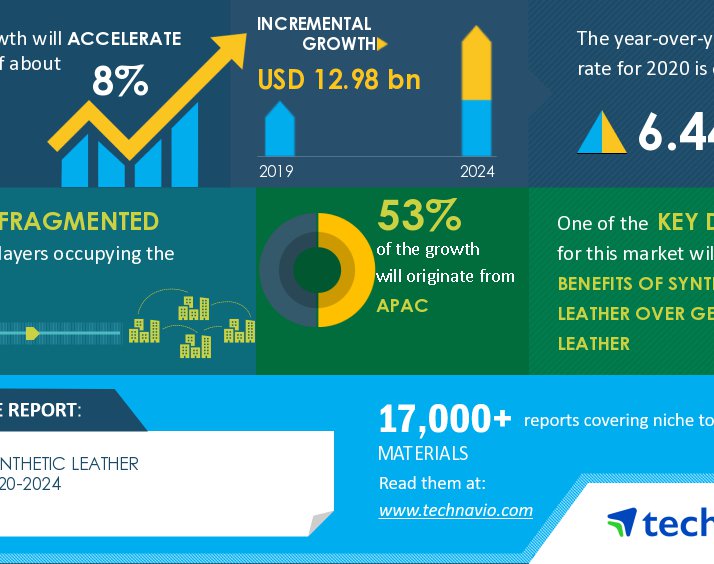Increasing Awareness Regarding the Safety of Animals and the Environmental Pollution due to Leather Production are Key Factors Driving Industry Growth, Says Emergen Research. The raw materials for the synthetic leather production are heavily dependent on fossil fuels and increases carbon footprints. Thus, bio-based synthetic leather can be a major growth opportunity, considering the increasing regulations on the usage of toxic chemicals in the EU and North America.
The synthetic leather market is expected to reach a market size of USD 80.20 Billion in 2028 and is expected to register a CAGR of 4.0% over the forecast period, according to recent analysis by Emergen Research. The projected growth figures are attributed to increasing awareness regarding the safety of animals and the environmental pollution associated with leather production. High import tariffs and stringent government regulations on killing and slaughtering animals for skins and hides have further driven demand for synthetic leather.
According to PETA, billions of animals are slaughtered every year for their skin and hides, and such cruelty toward animals has drawn global attention. Stringent rules and regulations regarding animal welfare are now strictly enforced in various countries. In addition, the tanning industry is an industry that causes rampant pollution; the pollution load from the tanning activity is estimated to be 50% more in weight than the weight of the hides processed. The water and air pollution generated from the industry has been subject to utmost attention. The stringent environmental regulations have led the firms to develop new technology and artificial leather to ensure environmentally sound production. Synthetic leathers are artificial leather and don't involve animal skin or hides, thereby leading to less water and air pollution.
However, the raw materials used in synthetic leather production are heavily dependent on fossil fuels and increases carbon footprints. The toxic chemicals and gases released from burning plastic cause health problems such as asthma and skin irritation, which is a restraining factor in synthetic leather market growth. The corporate groups are extensively investing in research and development to generate vegan alternatives, such as the Pinatex, a leather alternative made from pineapple leaf fibers to make shoes, bags, and other accessories. Other unique cruelty-free options which are gaining popularity are leaf leather, cork, recycled rubber, and mushroom leather. Thus, bio-based synthetic leather can be a major growth opportunity for synthetic leather manufacturers considering the increasing government regulations on the usage of toxic chemicals in the EU and North America.
Key Highlights of Report
- On 30th June 2020, Teijin Frontier, the Teijin group's fibers and products converting company, launched its new Solotex Eco-Hybrid high-stretch side-by-side (S/S) conjugated fiber. It is an eco-friendly plant-derived polymer with a chemically recycled polyester polymer with a versatile fineness. It is very stretchable and consists about 40% plant based raw materials, each featuring different heat-shrinkage characteristics to enable the formation of coiled crimp yarn. The fiber was introduced as a featured product for autumn and winter apparel, sportswear, uniform, and many more.
- The European region held the second highest market share in 2020 and is expected to exhibit a significant growth rate during the forecast period. The major countries contributing to growth of artificial leather in this region are Germany, UK, France, and Italy. Presence of international clothing, footwear and bags brands, and stringent regulations promoting the use of bio-based leather are driving synthetic leather market growth.
- Major companies in synthetic leather market are H.R. Polycoats Pvt. Ltd., Kuraray Co., Ltd., Teijin Limited, Zhejiang Hexin Industry Group Co., Ltd., Alfatex N.V., San Fang Chemical Industry Co., Ltd., Filwel Co., Ltd., Yantai Wanhua Synthetic Leather Group Co., Ltd., BASF SE, Mayur Uniquoters Limited.



